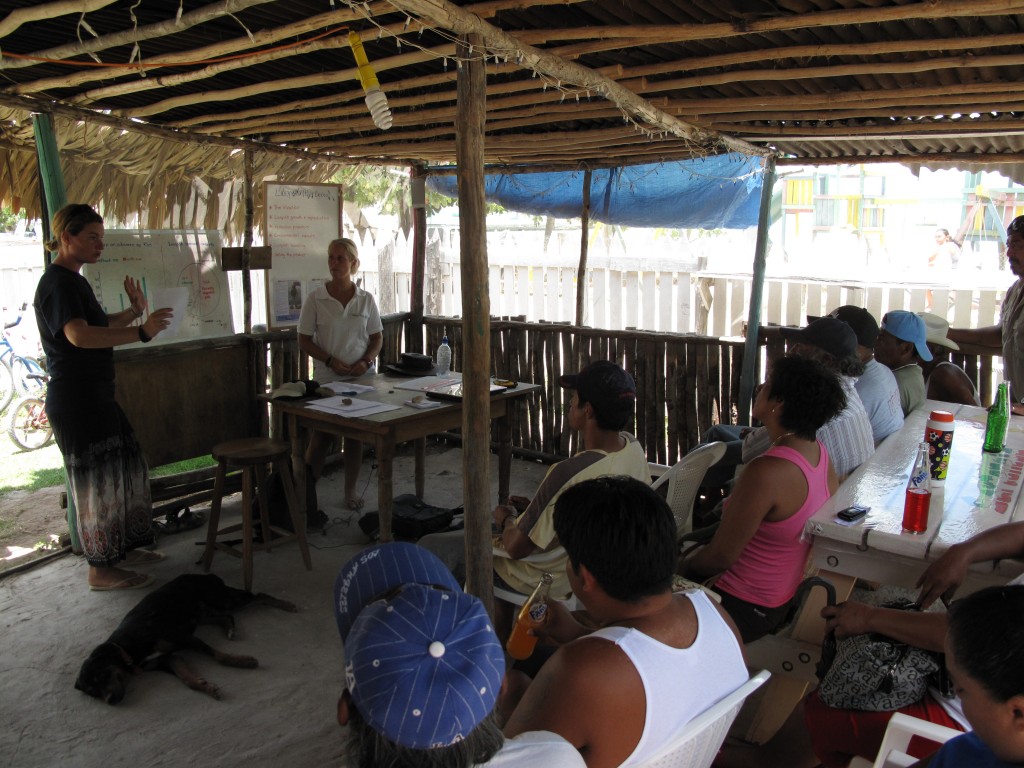By Richard Nimmo, Blue Ventures Expeditions Managing Director.
In May I visited Belize to catch-up with the amazing progress that the Blue Ventures team and volunteers have made in recent months.
My visit began in the village of Sarteneja in northern Belize, our community base and one of the largest fishing communities in Belize.
Spirits were low amongst the fishing community, as the conch (Strombus Gigas) season had finished due to the quota being reached early this year. With most of the fisherman in Sarteneja relying on conch and lobster to provide their incomes this early season closure left them without their normal focus and income.
The Blue Ventures team running a lionfish workshop lightened the mood a little. Lionfish (Pterois volitans) are voracious predators and since their introduction to the Western Atlantic they have steadily spread south and are now a major presence in the Caribbean Sea. The workshops provide general information about lionfish, including how to handle them to avoid being injured by their poisonous dorsal spines. The Blue Ventures workshops are linked to a national initiative and Blue Ventures staff and volunteers are working with partners to monitor the lionfish populations and to also target them in the protected areas that we monitor by spearfishing as part of a coordinated campaign (please click here to see the campaign page)
During the workshops the stomach contents of lionfish are analysed in order to get a better understanding of the lionfish prey species. At the workshop that I attended shrimps, juvenile wrasse and juvenile parrotfish were all identified within the stomachs of the lionfish that were studied.
In addition to taking lionfish out of the sea by spearfishing, Blue Ventures has been leading discussions with the National Fishermen Producers Cooperative Society in Belize to encourage them to buy lionfish for processing and export and to therefore create a demand for the fish that will encourage fishers to catch this species. The aim is to create a win-win, with fishers and the Co-operative benefiting from a new marketable species and the eco-system benefiting from increased fishing pressure on an invasive species that has no natural predators in the region. At the Blue Ventures workshops a local café host the events and also cooks delicious Belizean dishes using lionfish rather than more commonly eaten local fish. The lionfish tastings hope to go some way to change Belizean tastes and to create another source of demand for the fish. Judging by the empty plates at the workshop I attended, lionfish was enjoyed by all.
I spent 6 days in Sarteneja and stayed in a home-stay, hosted by Yvette and Ricky Verde and their lovely family. Blue Ventures volunteers all stay in home-stays whilst in Sarteneja and this gives our volunteers the chance to experience Belizean life and also gives direct economic benefits to a large number of households in the village.
After Sarteneja the next stop was Bacalar Chico Marine Reserve and the Blue Ventures dive camp. Blue Ventures has entered into a partnership with Shipstern Nature Reserve (www.shipstern.org) who own the land where the Blue Ventures dive camp is situated. In May we completed the first stage of the major refurbishments that has been on-going since Christmas, the dive camp is looking fantastic and now has five brand new cabanas to house our volunteers.



